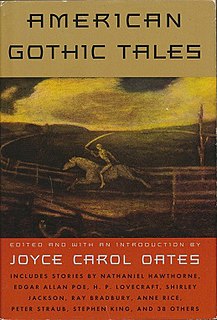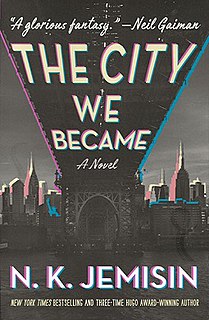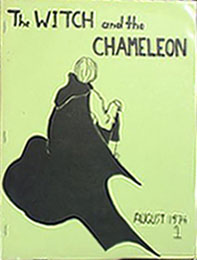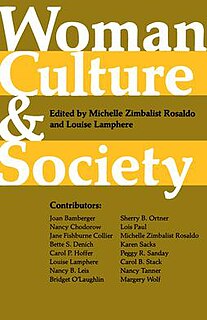 W
WFeminist literature is fiction, nonfiction, drama, or poetry, which supports the feminist goals of defining, establishing, and defending equal civil, political, economic, and social rights for women. It often identifies women's roles as unequal to those of men – particularly as regarding status, privilege, and power – and generally portrays the consequences to women, men, families, communities, and societies as undesirable.
 W
WThis is a list of feminist comic books and graphic novels.
 W
WAmerican Gothic Tales is an anthology of "gothic" American short fiction. Edited and with an Introduction by Joyce Carol Oates, it was published by Plume in 1996. It featured contributions by Washington Irving, Nathaniel Hawthorne, Edgar Allan Poe, Stephen King, Anne Rice and others, and included over 40 stories.
 W
WAqueduct Press is a publisher based in Seattle, Washington, United States that publishes material featuring a feminist viewpoint.
 W
WThe City We Became is a 2020 urban fantasy novel by N. K. Jemisin. It is the first in her Great Cities series. It was developed from her short story "The City Born Great". It is her first novel since her triple Hugo Award-winning Broken Earth series.
 W
WDaughters of Eve is a 1979 novel by Lois Duncan. Incorporating feminist themes, the novel follows a group of young women who become convinced to punish their fathers by a charismatic teacher.
 W
WDragon Ladies: Asian American Feminists Breathe Fire is a book edited by Sonia Shah, published in 1997. The work contains a preface by Yuri Kochiyama and a foreword by Karin Aguilar-San Juan. The book is divided into four parts: Strategies and Visions, An Agenda for Change, Global Perspectives, and Awakening to Power, consisting of a collection of 16 essays and interviews by Asian American writers, artists and activists presenting their views on feminism.
 W
WThe Feminist Press is an American independent nonprofit literary publisher that promotes freedom of expression and social justice. It publishes writing by people who share an activist spirit and a belief in choice and equality. Founded in 1970 to challenge sexual stereotypes in books, schools and libraries, the Press began by rescuing “lost” works by writers such as Zora Neale Hurston, Charlotte Perkins Gilman and Rebecca Harding Davis, and established its publishing program with books by American writers of diverse racial and class backgrounds. Since then it has also been bringing works from around the world to North American readers. The Feminist Press is the longest surviving women’s publishing house in the world. The Press operates out of the Graduate Center at the City University of New York (CUNY).
 W
WThe Group is the best-known novel of American writer Mary McCarthy. It made New York Times Best Seller list in 1963 and remained there for almost two years. In 1966, United Artists released a film adaptation of the novel directed by Sidney Lumet.
 W
WHiromi Itō is one of the most prominent women writers of contemporary Japan, with more than a dozen collections of poetry, several works of prose, numerous books of essays, and several major literary prizes to her name. She divides her time between the towns of Encinitas, California and Kumamoto in southern Japan. She is currently teaching at School of Culture, Media and Society in Waseda University, Tokyo.
 W
WJanus was a feminist science fiction fanzine edited by Janice Bogstad and Jeanne Gomoll in Madison, Wisconsin, and closely associated with that city's science fiction convention, WisCon It was repeatedly nominated for the Hugo Award for Best Fanzine ; this led to accusations that if Janus had not been feminist, it wouldn't have been nominated. Eighteen issues were published under this name from 1975–1980; it was succeeded by Aurora SF.
 W
WKinflicks (1976) is a novel by American writer Lisa Alther. It was Alther's first published work, and the "subject of considerable pre-publication hyperbole."
 W
WMagical feminism is a subgenre of the magical realism literary genre. The term was first used in 1987 by Patricia Hart to describe the works of Isabel Allende. More recent critical works on the subject feature such scholars as Ricci-James Adams or Kimberley Ann Wells. The term magical feminism refers to magical realism in a feminist discourse. Magical realism's basic assumption is the coexistence and effective merging of contradictory worldviews, the scientific and rational with the spiritual and magical. It grants equal ontological status to real figures and spirits, everyday occurrences and supernatural events. In its nature then is the subversion of monolithic cultural, social and political structures. It is a mode perfect for the writers who are in between, especially the postcolonial ones.
 W
WThe Oasis is a short satirical novel by the American writer Mary McCarthy, published by Random House in 1949. McCarthy describes this, her second novel, as a "conte philosophique". It tells the story of a group of embattled intellectuals, their quest to establish a Utopian community in the mountains of New England, and their failure to surmount ideological and personal differences for the greater good of the commune. Doubling as a roman à clef, The Oasis borrows heavily from McCarthy's experiences and frustrations with the short lived European-American Group, and serves more broadly as a critique of the “abstract idealism of intellectuals” and their inability to enact actual change.
 W
WValley of the Dolls is the first novel by American writer Jacqueline Susann. Published in 1966, the book was the biggest selling novel of its year. To date, it has sold more than 31 million copies, making it one of the best-selling works in publishing history.
 W
WThe Witch and the Chameleon was a Canadian science fiction fanzine published 1974–1976 by Amanda Bankier in Hamilton, Ontario. It is generally recognized as the first explicitly feminist fanzine. It ran for five issues, the last being nominally a "double issue" numbered 5/6.
 W
WWoman, Culture, and Society, first published in 1974, is a book consisting of 16 papers contributed by female authors and an introduction by the editors Michelle Zimbalist Rosaldo and Louise Lamphere. On the heels of the 1960s feminist movement, this book challenged anthropology's status quo of viewing studied cultures from a male perspective while diminishing female perspectives, even considering women as comparatively imperceptible. It is considered to be a pioneering work.